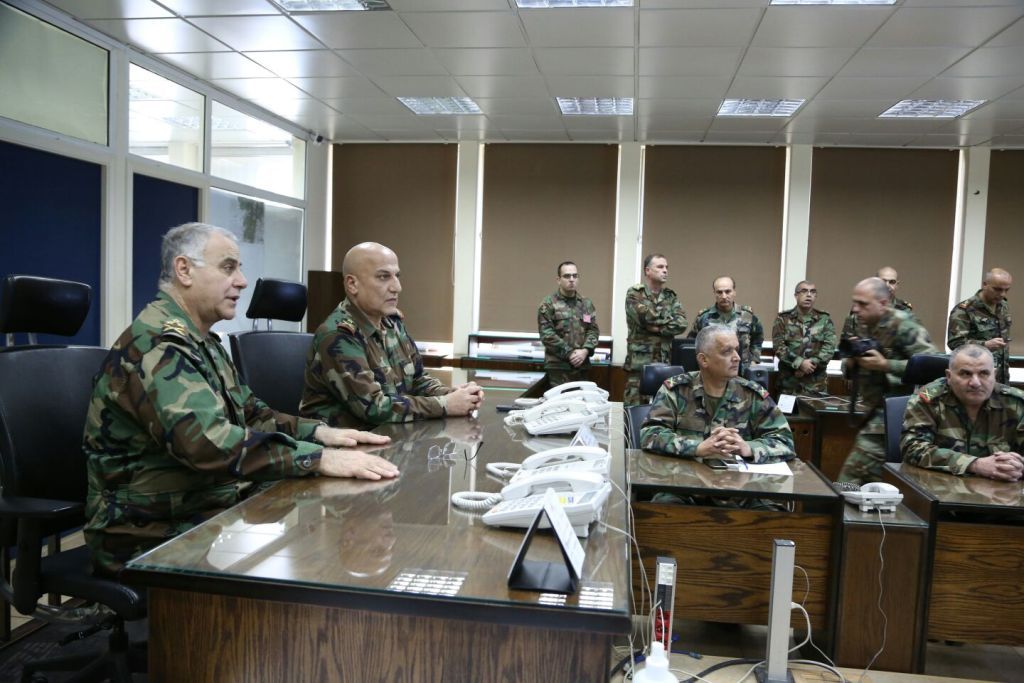Beirut – The third extended term of Lebanese Army chief Gen. Jean Qahwaji began on Saturday despite doubts by some political parties about the extension’s legality after it was carried out by a decision made by the defense minister and not the government.
Constitutionally, the cabinet should take a decision on the extension of the army chief’s term, which expired in 2013 and was later extended three consecutive times to avoid a vacuum at the helm of the military institution.
The extension came as a result of the failure of the rival political parties to reach consensus on a new army commander and the insistence of other politicians to keep Qahwaji in his post to set the stage for his candidacy to the presidency.
If the same rule, which has brought Lebanon’s two last presidents to power, was adopted, then Qahwaji should be the country’s new head of state and fill the more than two-year vacuum at Baabda Palace.
But the army commander’s calculations are different than his predecessors – Emile Lahoud, who was elected president in 1998 during the Syrian hegemony, and Michel Suleiman, who came to power in 2008 as a result of a regional determination to resolve the country’s political crisis.
Qahwaji is currently facing one of the most difficult times of his political-military career. He leads the military institution that is seen as the backbone of Lebanon’s security which is in constant threat as a result of the five-year war in neighboring Syria.
The crisis in Syria continuously threatens Lebanon’s security that is always on the verge of spiraling out of control.
The army is one of the last institutions that function properly and receive backing from across the political spectrum. Qahwaji seeks to keep the balance but whenever he appeases one camp, he angers a rival alliance.
Some parties believe that Change and Reform bloc leader MP Michel Aoun, who is a presidential candidate, has rejected the extension of Qahwaji’s term for considering the army chief as his rival for the country’s top post. But although the general has been considered one of the presidential candidates, he has never announced his intention to run in the elections.
Strategic expert Nizar Abdul Qader said: “Any (Christian) Maronite who reaches the army leadership, directly becomes a presidential candidate, but without announcing it.”
“Four generals have reached the presidency, including Aoun albeit in different circumstances when he headed the premiership in 1988” during the country’s civil war, he said.
“I don’t think that Qahwaji has declared his candidacy but his name is circulated to fill the post,” the expert told Asharq Al-Awsat.
The presidential vacuum “is linked to Iranian obstacles via the so-called Hezbollah.” Tehran seeks to become a regional player through its continued support to Syria’s regime and by having a final say in Lebanon’s presidential elections to keep the pressure on Arabs and the international community, said Abdul Qader.
He also told Asharq Al-Awsat that the extension of Qahwaji’s term was the result of “the cabinet’s paralysis and its failure to appoint a new army commander.”
Aoun is trying to become an obstacle to the extension because he fears that Qahwaji would remain a strong candidate for the presidency if he stays in the military institution, Abdul Qader said.
He stressed that the general is always prone to “friendly fire” although he stands at an equal distance from all sides.
At the level of security, Qahwaji has the same views as Hezbollah on the need to fight armed Syrian groups and control the security situation. But on sovereign issues, he agrees with the March 14 camp which hasn’t placed a direct veto on him.
As for Hezbollah, it has remained silent about his possible candidacy. But the party has seemingly set the idea aside and instead stuck to its ally Aoun, who seems to be nearing his ambition into receiving the consensus of the rival political parties onto reaching Baabda Palace.
But it is said that Qahwaji is Speaker Nabih Berri’s favorite candidate, who prefers a consensual figure that would “help restore security, political and economic stability.”
Qahwaji was born in the southern border town of Ain Ebel (his mother’s hometown) on September 23, 1953. But he hails from the Shouf town of Baatharan in Mount Lebanon.
He started his military career when he joined the military academy on October 1, 1973. He moved in ranks and posts until he reached the army leadership in 2008 after his appointment to succeed Suleiman, who was later elected president.
Qahwaji considers the defense ministry his semi-permanent home but respects occasions and spends Sundays with his family.
He is married to Marleine Sfeir and has three children – Jad, Joe and Joanna.
His only daughter Joanna says her father doesn’t have the military mentality and tries to simplify problems through his diplomatic means. He also rejects imposing his opinion on others and resorts to dialogue until a problem is resolved.
“Even if I don’t see my father on a daily basis, he is always there for me,” she says.
